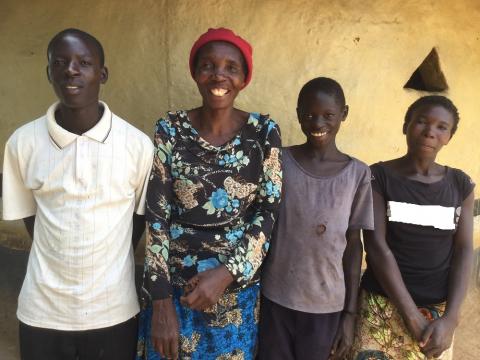WASH boosts child protection in Zambia

By Mutinta Chiseko
For a long time, children in Chikwampu village, a small remote area in Eastern Zambia, experienced a lot of challenges which deprived them of enjoying the life that every child deserves.
Located 99 kilometers from Zambia’s capital city, Lusaka, this village with a typical savanna climate, has over 26 sparsely populated households. Until recently, one of the biggest challenges faced by the inhabitants of this area was access to clean water.
Fifty-nine-year-old Belita is a widowed peasant farmer who has lived in Chikwampu village since 1992. The mother of six says her community previously had no alternative but to drink unsafe water from a stream.
“Our only water source was a shallow stream which is very far from our houses. Animals including goats, dogs, cows and pigs also drank and bathed in it,” says Belita Chitabalala. Apart from drinking contaminated water, women had to walk long distances every day to and from the stream which was the only available source. Girl children were also tagged along to the stream in keeping with the local culture.
Like other women in this community, Belita and her daughters used to walk through a dense bush to reach the stream.
“My daughters and I used to take turns walking through tall grass to the stream whilst other family members attended to the farming field, “says Belita.
The bush around most homes in Chinkwampu grows much thicker in summer making the paths to the stream hazardous. Belita explains that it was not safe to walk to and from the stream.
In May of 1998, Chikwampu recorded the highest rate of criminal attacks on girl children among several other villages in this part of the country. Unfortunately, Belita’s youngest daughter, Mary (13) was one of the victims.
“My daughter volunteered to go to the stream for water that morning while the rest of us went to the farming field. On her way back she was attacked by two men who brutally raped her,” says Belita in a somber tone.
“It was a difficult situation for my children and I to bear. I used to hear a lot of stories about the attacks but didn’t really know how it felt until one of my own was involved,” she adds.
While Belita and her family were still trying to come to terms with what had just transpired, they had to brace for more.
“Two months after the attack, we discovered that my daughter was pregnant and had contracted the Human Immune Deficiency Virus (HIV), “Belita says.
According to Belita, trying to get over the whole situation and subsequently having to nurse her daughter was the hardest experience of her entire life and over the months the teenager had begun to suffer from different opportunistic infections.
“It was hard to see my little girl go through so much pain. She was too young to be a mother and her HIV status compounded the situation,” says Belita.
However, in 2014, World Vision requested the residents of Chikwampu village to prepare their communities for a Borehole. Every household was required to undergo sanitation and hygiene training as well as identify five water, sanitation and hygiene (WASH) basic needs.
“Because I never ever wanted any child in our village to go through what my daughter’s ordeal, I volunteered to be a hygiene promoter. I went round the village sensitizing people on the importance of sanitation and hygiene and fulfilling the five WASH basic needs,” explains Belita.
In 2015 World Vision drilled a borehole at a central location in Chikwambp village. Since then women and children no longer have to walk through the dense bush to fetch water from the stream. With this new access to clean and safe water nearby, the number of attacks on girl children in the area have also gone down.
“We are very thankful to World Vision for bringing clean water and hope to us. God bless you World Vision.”
“Even though my daughter is in heaven with the Lord, I know that no girl child in our village will suffer as much as she did. They can now safely help their mothers to fetch water,” says Belita.
Today, Belita has dedicated much of her time to sensitize communities in the surrounding villages on sanitation and hygiene. Her two-pronged approach seeks to improve access to clean water and keep girl children are safe.